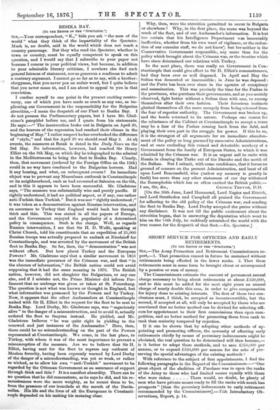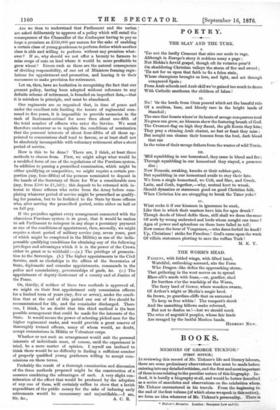SHORT SERVICE FOR OFFICERS AND EARLY RETIREMENTS.
[TO THE EDITOR OF THE "SPEOTATOR.1
Sru,—The Army Promotion and Retirement Commissioners re- port,-1. That promotion cannot in future be sustained without retirements being effected in the lower ranks. 2. That these retirements must in some form be brought about or accompanied by a pension or sum of money.
The Commissioners estimate the amount of permanent annual charge necessary to bring about retirements at about /.350,000, and to this must be added for the next eight years an annual
charge of nearly double this sum, in order to give compensation for injury done to existing interests. The first of these two con-
clusions must, I think, be accepted as incontrovertible, but the second, if accepted at all, will only be accepted by those who are convinced that no better method can be devised for selecting offi- cers for appointment to their first commissions than open com- petition, and no better method for promoting them from rank to rank than seniority tempered by rejection.
If it can be shown that by adopting other methods of ap- pointing and promoting officers, the necessity of effecting early
retirements chiefly by means of pecuniary inducements might be obviated, the real question to be determined will then become,— is it better to adopt these methods, and to save £350,000 per annum, or to expend £350,000 per annum for the sake of pre- serving the special advantages of the existing methods ?
With reference to the subject of first appointments, I find the following paragraphs in the Report of the Commissioners :—" One great object of the abolition of Purchase was to open the ranks of the Army to those who had limited means equally with those who were richer There would, no doubt, be plenty of
men who have private means ready to fill the ranks with much less prospects" [than the pecuniary inducements to early retirement recommended by the Commissioners].— Vide Introductory Ob- servations, Report, p. 14.
Are we then to understand that Parliament and the nation are asked deliberately to approve of a policy which will entail the consequence of the Chancellor of the Exchequer having to pay so large a premium as 2350,000 per annum for the sake of enabling a certain class of young gentlemen to perform duties which another class is able and willing to perform without any premium what- ever? If so, why should we not offer a bounty to farmers to raise crops of oats on land where it would be more profitable to grow wheat? Errors such as these are the natural consequence of dividing responsibility, of one set of Ministers framing regu- lations for appointment and promotion, and leaving it to their successors to make provision for retirement.
Let us, then, have no hesitation in recognising the fact that our present policy, having been adopted without reference to any definite scheme of retirement, is founded on imperfect data,—that it is mistaken in principle, and must be abandoned.
Our regiments are so organised that, in time of peace and under the excellent rule limiting the tenure of regimental com- mand to five years, it is impossible to provide vacancies in the rank of lieutenant-colonel for more than about one-fifth of the total number of officers who enter the Service. We must therefore endeavour so to regulate the conditions of nomination that the personal interests of about four-fifths of all those ap- pointed to commissions shall tend to favour, or at least shall not be absolutely incompatible with voluntary retirement after a short period of service.
How is this to be done? There are, I think, at least three methods to choose from. First, we might adopt what would be a modified form of one of the regulations of the Purchase system. In addition to passing a prescribed examination, which might be either qualifying or competitive, we might require a certain pro- portion (say, four-fifths) of the persona nominated to deposit in the hands of the Secretary of State for War a considerable sum (say, from 2500 to £1,500); this deposit to be returned with in- terest to those officers who retire from the Army before com- pleting whatever period of service might be prescribed as qualify- ing for pension, but to be forfeited to the State by those officers who, after serving the prescribed period, retire either on half or on full pay.
If the prejudice against every arrangement connected with the obnoxious Purchase system is so great, that it would be useless to ask Parliament to reimpose in any shape a pecuniary payment as one of the conditions of appointment, then, secondly, we might require a short period of military service (say, seven years, part of which might be completed in the Militia) as one of the indis- pensable qualifying conditions for obtaining any of the following privileges and advantages which it is in the power of the Crown either to grant or to withhold :—(a.) The privilege of presenta- tion to the Sovereign. (b.) The higher appointments in the Civil Service, such as clerkships in the offices of the Secretaries of State, diplomatic and consular appointments, commands in the police and constabulary, governorships of gaols, &c. (c.) The appointment of deputy-lieutenant of a county and of Justice of the Peace.
Or, thirdly, if neither of these two methods is approved of, we might on their first appointment only commission officers for a limited term of years (say, five or seven), under the condi- tion that at the end of this period one out of five should be recommissioned for life, and the remainder discharged. There can, I think, be no doubt that this third method is the best possible arrangement that could be made for the interest; of the State. It would secure the power of selecting picked men for the higher regimental ranks, and would provide a great reserve of thoroughly trained officers, many of whom would, no doubt, accept commissions in Militia or Volunteer corps.
Whether or not such an arrangement would suit the personal interests of individuals must, of course, until the experiment is tried, be a mere matter of opinion. I myself am inclined to think there would be no difficulty in finding a sufficient number of properly qualified young gentlemen willing to accept com- missions on these terms.
Probably the result of a thorough examination and discussion of the three methods proposed might be the construction of a measure combining the advantages of each. A very slight con- sideration of the effect that would be produced by the adoption of any one of them, will certainly suffice to show that a lavish expenditure of the public money for the sake of inducing early retirements would be unnecessary and unjustifiable.—! am,































 Previous page
Previous page